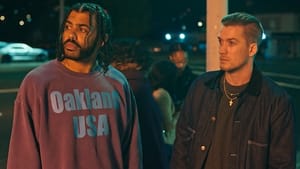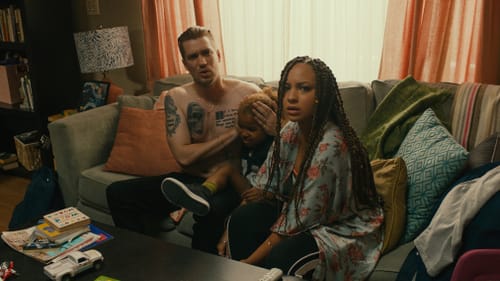Stay in the Loop
BSR publishes on a weekly schedule, with an email newsletter every Wednesday and Thursday morning. There’s no paywall, and subscribing is always free.
Between masks and labels
'Blindspotting,' by Rafael Casal and Daveed Diggs

Billed as a comedy/drama, Rafael Casal and Daveed Diggs’s Blindspotting, the opening-night film at Philadelphia Film Society's Springfest, is a challenging, poignant movie. It's also part of a new generation of black reality-horror films ushered in by Jordan Peele’s Get Out. Decades from now, when film historians look back at this period, I believe these two films will be grouped together.
After serving a two-month prison sentence, Collin (Diggs) tries to get his life back on track despite the corrupting influence of his best friend Miles (Casal), a poor white kid who grew up in the same Oakland neighborhood. Collin sees a policeman fatally shoot an unarmed black man and struggles through his last few days of probation. Meanwhile, the effects of rapid gentrification push Miles toward increasingly rash decisions and violence.
Not your average buddy movie
Diggs and Casal are real-life friends; both lived in Oakland. As such their performances in are strong and realistic, although one would expect no less from Diggs, a breakout star from the original cast of Broadway’s Hamilton.
The film’s supporting roles also include another Hamilton cast member, Jasmine Cephas Jones as Miles’s girlfriend Ashley. Janina Gavankar (Sleepy Hollow, True Blood) plays Collin’s ex-girlfriend Val. Interracial relationships are central to the story, a nice touch that shows the intersectionality of the communities that cohabitate in this space.
This is Carlos Lopez Estrada’s debut as a feature-film director, and he compounds the film’s underlying themes effectively. His establishing shots show a changing urban Oakland intermingled with hipster transplants. An unconventional soundtrack of opera music serves as an interesting juxtaposition, instantly countering whatever preconceived notions an audience member might have about the city.
Estrada also includes several subtle cinema references. In a nod to Akira Kurosawa’s Rashomon, the opening court scene shows Collin staring directly into the camera as an unseen authority figure lurks offscreen. This judge’s physical absence suggests structural oppression, a clever visual metaphor for the anxiety caused by Collin’s probation curfew and the looming threat of police violence.

"Black joy and sheer terror"
Conceptually, this movie is quite brilliant. Even before Val explains “blindspotting” as the difference between what we are and how we are perceived, it’s clear its themes examine the masks we wear and labels we are given. As a black man in Oakland, Collin is seen as a criminal suspect by police officers who might easily justify shooting him. Conversely, Miles may be born and raised in Oakland but superficially, he’s indiscernible from a tech bro who has the same neck tattoo at a house party.
The filmmakers intentionally show the layered nuance of this dynamic among the poor of all races. Even Oakland’s white artists — many of whom were likely viewed as gentrifiers themselves when they moved into the neighborhood — are being pushed out by the new generation of tech money flooding the entire San Francisco Bay area.
As a horror film, Blindspotting deftly gravitates between points of black joy and sheer terror, doubling the impact of each. The suddenness of the police killing reminds us how quickly things escalate and, in some cases, change forever. Following this event, Collin struggles with PTSD, triggered by daily traumas in a way that is both accessible and deeply disturbing.
His powerful nightmares depict symbolic images and sounds, such as black men in shackles and the gunshot blast of a judge’s gavel. In one nightmare, Collin’s inability to speak reveals his inner conflict about not giving a witness statement on the police killing — even though he knows doing so would jeopardize his probation.
However, his most powerful vision is a scene in which he imagines dozens of young black men standing in a field of graves, wearing the black hoodies synonymous with Trayvon Martin. Late in the film, when a police car turns its searchlight onto Collin, this scene is as scary as watching a slasher flick’s killer stalking his next victim.
While this film is likely to spark controversy from far-right conservatives, its tense third act is one of the most important moments in Black Lives Matter-era cinema. If you haven’t lived these experiences, there is no way to fully understand the fear that is accompanied by police presence in many communities of color; seeing this film is probably the closest one can get.
What, When, Where
Blindspotting. Directed by Carlos Lopez Estrada, written by Rafael Casal and Daveed Diggs. Philadelphia Film Society's Spring Showcase. April 27, 2018, at the Prince Music Theater, 1412 Chestnut Street, Philadelphia. Opens in wide release in summer 2018. Part of PFF Springfest, April 27-29, 2018.
Sign up for our newsletter
All of the week's new articles, all in one place. Sign up for the free weekly BSR newsletters, and don't miss a conversation.

 Rob Buscher
Rob Buscher